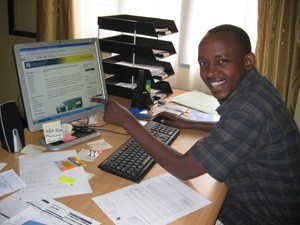
Few journalists have the luxury of time and funding necessary to conduct in-depth research on the ground for a story. Thanks to a USAID partnership with the Rwandan government, a 25-year-old Rwandan journalist, Eugene Kwibuka, now has that privilege.
Kwibuka is a freelance print and radio journalist from Rwanda, a country where media freedom is a sensitive topic. His team of three journalists was recently awarded a U.S. Millennium Challenge Corporation (MCC) grant that helped them improve their skills to report on issues that are both complex, and important to the public.
During the 1994 genocide, radio was used to spread hate ideology and to coordinate the killing of nearly one million people in Rwanda. The country's tragic history is frequently cited by the government as a justification for restrictions on the media. For this reason, it is particularly important for Rwanda's media to provide accurate information and a constructive forum for debate and consensus-building.
To help journalists develop their skills, the Rwanda MCC Threshold Program Media Strengthening Project, administered by USAID in partnership with the Government of Rwanda and implemented by IREX, held a series of competitions for grants to help journalists produce effective feature stories. Kwibuka's team was awarded a grant to develop a story about how the complex relations between Rwanda and its neighboring country, the Democratic Republic of Congo, impact ordinary people.
"The grant process improved my abilities to present my ideas in a convincing way and explain the issues to a broader audience," Kwibuka said.
Kwibuka is ready to apply his improved skills to new feature stories. As he continues to pursue his career, "strengthening his professionalism and helping the media industry regain the trust of Rwanda's public" are his goals. A vibrant and professional media that provides voice to the public can help further Rwanda's development by sharing information and creating the space for constructive dialogue. With support, reporters like Kwibuka can help to build an open environment for journalism in Rwanda.







Comment
Make a general inquiry or suggest an improvement.